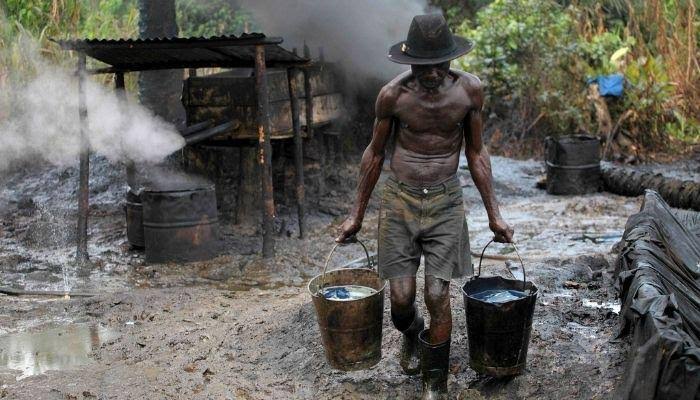The scale and persistence of crude oil theft in Nigeria represent a monumental problem. Twelve-year data (2009-2021) from NEITI annual audit reports show that the country lost 643 million barrels of crude oil valued at 48 billion dollars (17.1 trillion Naira), primarily due to theft. This is more than half of the country’s 2021 debt stock of $90.89 billion. While several factors, including poor metering technology at the oil wells or flow stations and other technical flaws, are implicated in the losses, the dominant factor is oil theft. Nigeria has yet to meet its OPEC-approved daily oil production quota, even as Africa’s largest oil producer, due to oil theft. Indeed, the quota has declined from 2.5 million barrels per day in 2010 to the current 1,380 million. Currently, the country cannot meet its drastically reduced quota due to production and supply chain disruptions occasioned by stealing. With daily average losses of 100,000barrels of oil per day in 2013 to 400,000 barrels per day in 2023, Nigeria tops the chart among the countries with the highest incidence of oil theft globally.
The two major categories of crude oil theft are large-scale oil thefts that involve a sophisticated network of powerful actors, including foreign buyers of stolen crude, operators and security personnel, local and foreign transporters and top government officials. The second category is the small-scale local/artisanal oil theft. Small-scale or artisanal oil theft is carried out by persons who create underground economy and value chains for the product by engaging in illegal refining, purportedly to cushion the effects of economic hardship and scarcity of petroleum products. The artisanal oil thieves also operate in a formidable localised syndicate that includes local political elites. These unemployed youths carry out the oil refining, youth and community leaders who grant free passage to operators, security agents who extort money from illegal refiners, and oil company technical staff who supply information on pipeline vulnerabilities and inspection schedules. While we reckon with the enormous damage of the two forms of oil theft to the environment, society and the economy, we focus on small-scale crude oil theft and illegal refining in this briefing. Therefore, in this edition of Nextier SPD Policy Weekly, we explore the push and sustaining factors for artisanal oil theft and illegal refining to search for broader and more realistic solutions in approaching the problem from its aetiology rather than the symptoms.
- The Siamese twin of Local Bunkering and Illegal Refining and their Drivers
The Nigerian National Petroleum Corporation Limited declared in January 2024 that the Federal Government has destroyed 10,166 illegal oil refineries since 2021. Security forces destroyed another 82 and 7 such refineries in February and April 2024, respectively. Local oil theft and refining are tightly linked like Siamese twins because one provides raw material for the other. The intensity and near intractability of oil theft and illegal refining, despite the attendant risks in the business, could be understood in terms of its intricate web of stakeholders as well as the lapses in petroleum industry governance and distributive justice in Nigeria. Hence, we look at the risks and continuity despite increasing policing of the oil infrastructure and the factors that propel the economy of illegal oil refining.
In terms of risks, the three things that can go wrong in illegal refining have been articulated by some scholars: first, uncontrolled heat supply at the distillation units, which could cause the boiler to explode under high pressure to release the contents into the environment. Second, poorly improvised condensation units may not quickly cool the cauldron’s vapour to form the desired liquid products. The resulting pressure from this design inadequacy could lead to a disastrous explosion that releases inflammable vapour into the environment. Thirdly, the same poorly designed condensation unit does not guarantee total condensation of the vapour to liquid. Uncondensed vaporised products escape into the air, and a certain saturation level could pick fire from smoking or any nearby spark and turn into a massive inferno with attendant environmental consequences for terrestrial and aquatic ecosystems. Unsurprisingly, fire outbreaks are common in illegal refineries, commonly called “kpo fire.”From January 2021 to October 2023, 285 lives have been lost to explosions and fire in illicit refining of Nigeria.
Amidst the environmental and health hazards as well as the risk of immediate death from bunkering and illegal oil refining process, it remains a booming, active underground economy. Several reasons account for this. We can identify some issues around oil industry governance, such as the collapse of Nigeria’s four refineries, whose repair and maintenance have been subjects of politics and corruption. The country has four government-owned refineries with a total refining capacity of 4.45 million barrels per day (bpd). However, the progressive decline of the refineries over the years resulted in a total refining capacity of only 6000 bpd. The corruption surrounding the turnaround maintenance of the refinery has led to massive wasteful maintenance expenditure. For instance, the sum of 11.35 trillion Naira has been spent between 2010 and 2023 (excluding other costs in other currencies, which include $592,976,050.00, €4,877,068.47 and £3,455,656.93, on the renovation of refineries) to revive the refineries, yet they remain mostly dysfunctional.
The consequence of the corrupt neglect of local refineries and their decay is dependence on importing petroleum products purported to be sold to Nigerians at subsidised rates. Oil importation and subsidy also became a terrain of official scams and opaque management of public funds. Product availability is not guaranteed, while influential individuals amassed illicit wealth from the oil subsidy policy. A report of the Auditor General of the Federation cited by an NGO, SERAP, alleges that $2.1 billion in oil revenues and 3.1 trillion Naira budgeted as subsidy payments are missing and unaccounted for between 2016 and 2019. The country’s petroleum management organisation, NNPC, is also accused of being in the ring of several oil subsidy scams. The organisation is said to beinvolved in the underhand deals on oil subsidies in which over 10 billion dollars is allegedly stolen. Earlier in 2012, a report from the Nigerian legislature revealed a 6 billion dollar fraud by fuel importers who collect subsidy payments for petrol without importing any fuel. These impunities, which do not attract any punishment from the authorities, combined with the continuous degradation of the Niger Delta environment and poverty in the region, give impetus to local people who assume they equally should have a slice from a God-given resource in their land.
Connected with the failure of petroleum governance is the inability of the government to actively support the emergence of modular refineries to at least target production for local consumption. Daily oil consumption in Nigeria declined from 64.96 million to 52 million litres as of August 2023. Meanwhile, in February 2024, the Nigerian Navy uncovered 15 illegal refining sites that could process 2.7 million litres of crude daily. Such illegal refining emerged to fill the productivity gaps of government-owned refineries or properly supported private modular refineries. The government had licensed 25 modular refineries to serve domestic needs. Yet, only five of them are operating, and ten are in different stages of completion. The few operational ones, however, need help with the challenges of accessing foreign exchange to purchase crude oil in dollars due to the depreciation of Nigeria’s local currency. This means that an important source that could have served local consumption needs to reduce importation is starved of crude oil requirementsand cannot attain the expected production level.
Another lapse from the government is the role of security institutions deployed to protect the oil infrastructure. A study by Transparency International reports that security forces take part in oil theft by providing cover and protection in return for a share of the product. Military personnel and the police are said to escort tankers to the pipeline and provide a security perimeter for a fee of 600,000 Naira per night. A private pipeline security company, Tantita Security Services, also accused the Nigerian Navy of shielding suspected oil thieves being pursued by the personnel of Tantita. In all, there is a failure of the NNPC, the security personnel (the police, military, and others involved in providing pipeline security), and some ministries, departments, and government agencies connected with the petroleum industry. Indeed, recent interventions by the destruction of illegal refineries have mitigated oil thefts and illegal refining.
Nonetheless, any seeming gain from the demolition approach would be short-lived as more illegal refineries continue to be discovered. It is only a matter of setting up the right networks for reaching out to the personnel of the security agencies, and the stealing network would be re-engineered. These failures are constantly in the view of communities and stakeholders who have the capacity to engage in the sabotage of the oil industry. In all, the collapsed ethics of governance yielded the moral basis of justification for artisanal-level bunkering and illegal oil refining.
- Summary of Research Findings
The persistent and large-scale problem of crude oil theft in Nigeria has severe economic ramifications. Over twelve yearsfrom 2009 to 2021, Nigeria lost 643 million barrels of crude oil, valued at $48 billion, primarily due to theft. This loss amounts to over half of the nation’s debt stock in 2021. Factors contributing to these losses include poor metering technology and other technical flaws, but the dominant factor remains theft. Consequently, Nigeria, despite being Africa’s largest oil producer, struggles to meet its OPEC-approved daily oil production quota, which has declined from 2.5 million barrels per day in 2010 to 1.38 million barrels per day. Currently, the country fails to meet this reduced quota due to theft and supply chain disruptions, with daily theft rates escalating from 100,000 barrels per day in 2013 to 400,000 in 2023.
Crude oil theft in Nigeria falls into two major categories: large-scale and small-scale artisanal theft. Large-scale theft involves a sophisticated network of actors, including foreign buyers, security personnel, local and foreign transporters, and top government officials. On the other hand, small-scale or artisanal theft is carried out by locals who create an underground economy, often with the collaboration of local political elites and security agents. This underground economy thrives despite the numerous risks associated with illegal refining, such as uncontrolled heat supply, poorly designed condensation units, and frequent fire outbreaks. From January 2021 to October 2023, 285 lives were lost to explosions and fires in illicit refineries. This persistence can be attributed to several factors, including the collapse of Nigeria’s four refineries, which now function at a fraction of their capacity due to corruption and mismanagement.
The government’s failure to actively support modular refineries further exacerbates the situation. Of the 25 licensed modular refineries intended to meet domestic needs, only five are operational, hindered by challenges such as accessing foreign exchange. Consequently, illegal refineries have emerged to fill the productivity gaps left by dysfunctional government-owned refineries.
Security institutions protecting oil infrastructure often exacerbate the problem by colluding with oil thieves. Reports reveal that security forces provide protection for a fee, undermining efforts to combat theft. Recent interventions, such as the destruction of illegal refineries, have offered temporary relief, but these gains are short-lived as new illegal operations quickly emerge.
The cumulative effect of governance failures, corruption, and the inability to effectively police oil infrastructure has fostered a moral justification for artisanal-level bunkering and illegal refining among local communities. Addressing this complex issue requires more than punitive measures; it demands a comprehensive approach that tackles the root causes, including the need for effective governance and economic opportunities for affected communities.
- Policy Findings
- Scale and Impact: Nigeria lost 643 million barrels of crude oil (valued at $48 billion) from 2009-2021 due to theft, more than half of the 2021 national debt.
- Quota Issues: Theft hinders Nigeria’s ability to meet OPEC quotas, reducing from 2.5 million barrels/day in 2010 to 1.38 million barrels/day.
- Daily Losses: Daily theft increased from 100,000 barrels/day in 2013 to 400,000 barrels/day in 2023.
- Large-Scale Theft: Involves sophisticated networks,including powerful actors, foreign buyers, security personnel, transporters, and government officials.
- Small-Scale Artisanal Theft: Conducted by locals creating underground economies, often with local political and security support.
- Refinery Hazards: Illegal refining involves risks like uncontrolled heat, poorly designed condensation units, and environmental hazards, causing 285 deaths from explosions between 2021-2023.
- Economic Drivers: Despite dangers, local refineries thrive due to economic need and government corruption.
- Refinery Decay: Nigeria’s four refineries, with a total capacity of 4.45 million bpd, now function at only 6,000 bpd due to corruption and mismanagement.
- Subsidy Scams: Massive corruption in oil importation and subsidies, with billions missing or unaccounted for between 2016 and 2019.
- Modular Refineries: The government’s inability to support modular refineries leads to reliance on illegal refineries.
- Involvement in Theft: Security forces often collude with thieves, providing protection for a fee.
- Short-lived Gains: Destruction of illegal refineries offers temporary solutions as new ones quickly emerge.
- ****To be continued.
(Dr. Ben Nwosu is an Associate Consultant at Nextier, a Senior Research Fellow at the Institute for Development Studies, University of Nigeria. Dr. Ndu Nwokolo is a Managing Partner at Nextier and an Honorary Fellow at the School of Government at the University of Birmingham, UK.)



